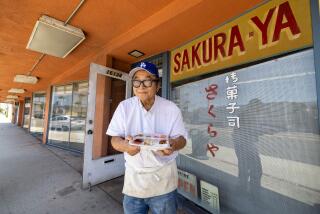From Japanese Mob to the Word of God
TOKYO — Standing in the pulpit, the Rev. Hiroyuki Suzuki looks as clean-cut as the collar on his Sunday dress shirt. He sings. He smiles. He pauses for a prayer.
When he raises his hands in a gesture of joy, however, it’s obvious to all that this pastor has a past.
Suzuki has the mark of the Japanese mob--the tips of both his pinkies have been severed. He’s done time, done drugs. But now he is serving a higher boss. And in a country that has never been particularly enamored of Christianity, he is becoming something of a celebrity.
Along with seven other former gangsters-turned-preachers, Suzuki has written a popular book, and he has spoken at a White House prayer breakfast and is negotiating for a late-night call-in show on network TV. He also preaches at one of the quirkiest churches in the country.
Suzuki and his fellow preachers call themselves Mission Barabbas, after the biblical thief who was spared crucifixion with Jesus.
They worship in a small white church hidden among the bars and body shops of a back street in Funabashi, a suburb east of Tokyo. A few dozen other Christians meet with them, attracted, they say, by the preachers’ mobster past.
The 43-year-old Suzuki was in the mob for 17 years.
Japan has an estimated 81,000 gangsters, known as yakuza, who engage in such illegal activities as drug trafficking, gun smuggling, pimping and running shady real estate deals.
The yakuza are divided into hundreds of gangs, with the members of each bound by fierce ties of loyalty to one another and to the gang boss. Gangsters are easily identified by full-torso tattoos, and sometimes by missing fingertips cut off to atone for disloyalty or foul-ups.
Suzuki went to jail twice for fighting with a rival gang.
But then he found God.
He thanks his wife, a South Korea-born Christian, for his conversion. At age 30, when years of hard living and a serious illness left him fearing for his life, he decided to try out her faith.
Suzuki soon quit the gangster life and, in 1992, founded Mission Barabbas. He says it’s a testimony to the power of God that “even yakuza can be reborn.”
He adds, however, that his underworld training--especially the loyalty part--still comes in handy.
“Essentially, we’re still yakuza,” he says. “The only difference is that we have a new boss.”
And, of course, a new motto--”Going all the way for God.”
Christians in Japan still have a long way to go. Fewer than 1% of Japanese are Christians, and that figure has changed little in decades.
Most Japanese adhere at least loosely to Buddhism and the indigenous religion of Shinto, which were already well established by the time the first Protestant missionaries arrived in 1859.
Mission Barabbas is undaunted.
Rain or shine, its preachers take to the streets to spread the message of Jesus. They use guitars, tambourines and large wooden crosses to get their point across.
They’re also not averse to relying on shock--taking off their shirts to reveal the elaborate tattoos of dragons, demons and carp on their backs and arms.
Last year, Mission Barabbas published a book, “Tattooed Christians,” telling in each man’s own words the story of his life and conversion. It has sold a respectable 10,000 copies, and a second printing is scheduled for this spring. Suzuki says he is pondering a sequel.
Meanwhile, Mission Barabbas is slowly but steadily growing, its congregation increasing from five to 60 in the three years since Suzuki started it.
Suzuki wants to raise enough money to set up a counseling center in Shinjuku, a rough area of Tokyo where gang members hang out.
With that, and with the planned TV show--to be shown in the middle of the night “because that’s when the people who most need help will be watching”--Suzuki is convinced he can win more converts, mobsters and law-abiding citizens alike.
Is there any chance he might revert to a life of crime?
“One hundred percent no,” Suzuki says. “I’ve had the drugs, the women, the alcohol and the gambling. I don’t need those things anymore. Now I’m happy just telling people about Jesus.”
More to Read
Sign up for Essential California
The most important California stories and recommendations in your inbox every morning.
You may occasionally receive promotional content from the Los Angeles Times.










